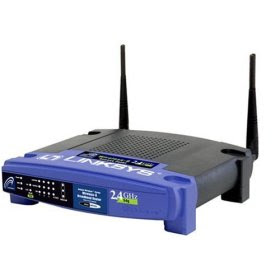 I have bought two units of Linksys WRT54GL wlan router previously so that I can run Linux and getting network security monitoring tools running on it as well. This little device has very limited space but you can't beat linux as router device. One of the unit is currently living in spoonfork's place to serve that Darth Vader, and another one is with me.
I have bought two units of Linksys WRT54GL wlan router previously so that I can run Linux and getting network security monitoring tools running on it as well. This little device has very limited space but you can't beat linux as router device. One of the unit is currently living in spoonfork's place to serve that Darth Vader, and another one is with me.Since Carter has argus supported on OpenWRT, I have been thinking of getting argus installed on it(MIPS platform). And after some tinkering, I have successfully loading argus on it and export the network flow to another box in the network. Here's the complete howto that you can follow exactly to get argus compiled for OpenWRT Kamikaze 8.09(MIPS platform) using Ubuntu Linux.
Prepare the environment, my main directory to build this is /home/geek00l/i-Projects -
shell>sudo apt-get install gcc g++ patch binutils \
flex bison make pkg-config unzip zlib1g zlib1g-dev \
libc6 libc6-dev gawk autoconf upslug2 libncurses5-dev
To build OpenWRT Kamikaze 8.09, svn up the source first -
shell>svn co https://svn.openwrt.org/openwrt/branches/8.09 kamikaze-8.09
shell>cd kamikaze-8.09
Start the building process -
shell>make defconfig
shell>make package/symlinks
shell>make menuconfig
shell>make
Take a coffee break when you run make .....
Install libpcap, this is the only dependencies we need to get argus 3 compiled -
shell>make package/libpcap-compile V=99
shell>make package/libpcap-install V=99
Check out the gcc that we need to use -
shell>/home/geek00l/i-Projects/kamikaze-8.09/staging_dir/toolchain-mipsel_gcc3.4.6/mipsel-linux-uclibc/bin/gcc --version
gcc (GCC) 3.4.6 (OpenWrt-2.0)
Copyright (C) 2006 Free Software Foundation, Inc.
This is free software; see the source for copying conditions. There is NO
warranty; not even for MERCHANTABILITY or FITNESS FOR A PARTICULAR PURPOSE.
Now we need to set the environment variables for this build -
shell>export PATH=/home/geek00l/i-Projects/kamikaze-8.09/staging_dir/toolchain-mipsel_gcc3.4.6/mipsel-linux-uclibc/bin:/home/geek00l/i-Projects/kamikaze-8.09/staging_dir/toolchain-mipsel_gcc3.4.6/bin:$PATH
shell>export AR=/home/geek00l/i-Projects/kamikaze-8.09/staging_dir/toolchain-mipsel_gcc3.4.6/mipsel-linux-uclibc/bin/ar
shell>export AS=/home/geek00l/i-Projects/kamikaze-8.09/staging_dir/toolchain-mipsel_gcc3.4.6/mipsel-linux-uclibc/bin/as
shell>export LD=/home/geek00l/i-Projects/kamikaze-8.09/staging_dir/toolchain-mipsel_gcc3.4.6/mipsel-linux-uclibc/bin/ld
shell>export NM=/home/geek00l/i-Projects/kamikaze-8.09/staging_dir/toolchain-mipsel_gcc3.4.6/mipsel-linux-uclibc/bin/nm
shell>export CC=/home/geek00l/i-Projects/kamikaze-8.09/staging_dir/toolchain-mipsel_gcc3.4.6/mipsel-linux-uclibc/bin/gcc
shell>export CPP=/home/geek00l/i-Projects/kamikaze-8.09/build_dir/toolchain-mipsel_gcc3.4.6/gcc-3.4.6-initial/gcc/cpp
shell>export GCC=/home/geek00l/i-Projects/kamikaze-8.09/staging_dir/toolchain-mipsel_gcc3.4.6/mipsel-linux-uclibc/bin/gcc
shell>export CXX=/home/geek00l/i-Projects/kamikaze-8.09/staging_dir/toolchain-mipsel_gcc3.4.6/mipsel-linux-uclibc/bin/g++
shell>export RANLIB=/home/geek00l/i-Projects/kamikaze-8.09/staging_dir/toolchain-mipsel_gcc3.4.6/mipsel-linux-uclibc/bin/ranlib
shell>export ac_cv_linux_vers=2.4.35
shell>export LDFLAGS="-static"
shell>export CFLAGS="-Os -s"
Time to have fun, doing cross-compile for argus so it works on MIPS platform -
shell>cd /home/geek00l/i-Projects/argus-3.0.1.beta.2
shell>./configure --host=mipsel-linux \
--with-openwrt=/home/geek00l/i-Projects/kamikaze-8.09/staging_dir \
--with-libpcap=/home/geek00l/i-Projects/kamikaze-8.09/build_dir/mipsel/libpcap-0.9.8
shell>make
shell>file bin/argus
bin/argus: ELF 32-bit LSB executable, MIPS, version 1 (SYSV), statically linked, stripped
Transfer it to my OpenWRT -
shell>scp -P 55555 bin/argus root@192.168.1.1:/tmp
To export argus network flow on ppp0 interface -
shell>argus -i ppp0 -B 192.168.1.1 -P 561 -d
To intercept the network flow -
shell>ra -S 192.168.1.1:561 - ip
I have found some good references here to get me going, and I would like to thank to David Watson(UK Honeynet) for his guide on building nepenthes on openwrt too.
Reference:
http://www.frontiernet.net/~beakmyn/CrossCompile.htm
http://www.ukhoneynet.org/research/building-nepenthes-on-the-openwrt-embedded-platform/
http://forum.openwrt.org/viewtopic.php?pid=31794
http://gargoyle-router.com/openwrt-coding.php
Since this embedded device has very limited space, there's no point to run packet logger locally, other tools I would like to run on it so that I can export pcap to other system should be something like packetforward or rpcap. If anyone has experience to get any of these tools installed on OpenWRT, please do share!
Enjoy (;])
Enjoy (;])